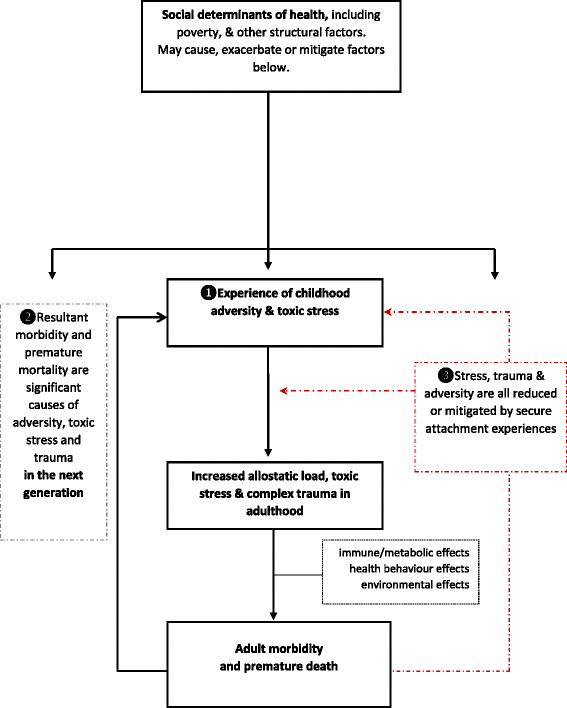Is there a link between childhood adversity, attachment style and Scotland's excess mortality? Evidence, challenges and potential research
- PMID: 27465498
- PMCID: PMC4964073
- DOI: 10.1186/s12889-016-3201-z
Is there a link between childhood adversity, attachment style and Scotland's excess mortality? Evidence, challenges and potential research
Abstract
Background: Scotland has a persistently high mortality rate that is not solely due to the effects of socio-economic deprivation. This "excess" mortality is observed across the entire country, but is greatest in and around the post-industrial conurbation of West Central Scotland. Despite systematic investigation, the causes of the excess mortality remain the subject of ongoing debate.
Discussion: Attachment processes are a fundamental part of human development, and have a profound influence on adult personality and behaviour, especially in response to stressors. Many studies have also shown that childhood adversity is correlated with adult morbidity and mortality. The interplay between childhood adversity and attachment is complex and not fully elucidated, but will include socio-economic, intergenerational and psychological factors. Importantly, some adverse health outcomes for parents (such as problem substance use or suicide) will simultaneously act as risk factors for their children. Data show that some forms of "household dysfunction" relating to childhood adversity are more prevalent in Scotland: such problems include parental problem substance use, rates of imprisonment, rates of suicide and rates of children being taken into care. However other measures of childhood or family wellbeing have not been found to be substantially different in Scotland compared to England. We suggest in this paper that the role of childhood adversity and attachment experience merits further investigation as a plausible mechanism influencing health in Scotland. A model is proposed which sets out some of the interactions between the factors of interest, and we propose parameters for the types of study which would be required to evaluate the validity of the model.
Keywords: Adverse childhood experiences; Attachment; Health inequalities; Mortality; Public health; Scotland; Social determinants of health.
Figures



Similar articles
-
Is there a "Scottish effect" for self reports of health? Individual level analysis of the 2001 UK census.BMC Public Health. 2006 Jul 21;6:191. doi: 10.1186/1471-2458-6-191. BMC Public Health. 2006. PMID: 16859539 Free PMC article.
-
Examining the role of attachment in the relationship between childhood adversity, psychological distress and subjective well-being.Child Abuse Negl. 2018 Feb;76:297-309. doi: 10.1016/j.chiabu.2017.11.012. Epub 2017 Nov 23. Child Abuse Negl. 2018. PMID: 29175733
-
Childhood Adversity and Hazardous Drinking: The Mediating Role of Attachment Insecurity.Subst Use Misuse. 2018 Jul 3;53(8):1387-1398. doi: 10.1080/10826084.2017.1409764. Epub 2018 Jan 15. Subst Use Misuse. 2018. PMID: 29333895
-
Scotland's public health palliative care alliance.Ann Palliat Med. 2018 Apr;7(Suppl 2):S99-S108. doi: 10.21037/apm.2018.03.13. Ann Palliat Med. 2018. PMID: 29764176 Review.
-
Perspectives on differing health outcomes by city: accounting for Glasgow's excess mortality.Risk Manag Healthc Policy. 2015 Jun 17;8:99-110. doi: 10.2147/RMHP.S68925. eCollection 2015. Risk Manag Healthc Policy. 2015. PMID: 26124684 Free PMC article. Review.
Cited by
-
The association between attachment pattern and depression severity in Thai depressed patients.PLoS One. 2021 Aug 18;16(8):e0255995. doi: 10.1371/journal.pone.0255995. eCollection 2021. PLoS One. 2021. PMID: 34407094 Free PMC article.
-
General practice recording of adverse childhood experiences: a retrospective cohort study of GP records.BJGP Open. 2020 May 1;4(1):bjgpopen20X101011. doi: 10.3399/bjgpopen20X101011. Print 2020. BJGP Open. 2020. PMID: 32071039 Free PMC article.
-
Association between childhood maltreatment and the prevalence and complexity of multimorbidity: A cross-sectional analysis of 157,357 UK Biobank participants.J Comorb. 2020 Jul 31;10:2235042X10944344. doi: 10.1177/2235042X10944344. eCollection 2020 Jan-Dec. J Comorb. 2020. PMID: 32844098 Free PMC article.
-
Introducing Routine Assessment of Adverse Childhood Experiences For Looked-After Children: The Use and Properties of the Trauma and Adverse Life Events (TALE) Screening Tool.J Child Adolesc Trauma. 2023 Jun 28;16(4):981-994. doi: 10.1007/s40653-023-00559-5. eCollection 2023 Dec. J Child Adolesc Trauma. 2023. PMID: 38045847 Free PMC article.
-
The impact of adverse childhood experiences on depression: the role of insecure attachment styles and emotion dysregulation strategies.Curr Psychol. 2023 Apr 13:1-11. doi: 10.1007/s12144-023-04613-1. Online ahead of print. Curr Psychol. 2023. PMID: 37359705 Free PMC article.
References
-
- McCartney G, Collins C, Walsh D, Batty D. Accounting for Scotland’s excess mortality: towards a synthesis. Glasgow Centre for Population Health Glasgow; 2011.
-
- Walsh D, Bendel N, Jones R, Hanlon P. Investigating a Glasgow effect- why do equally deprived UK cities experience different health outcomes? Glasgow Centre for Population Health Glasgow. - PubMed
-
- Schofield L, Walsh D, Munoz-Arroyo R, McCartney G, Buchanan D, Lawder R, Armstrong M, Dundas R, Leyland AH. Dying younger in Scotland: trends in mortality and deprivation relative to England and Wales, 1981–2011. Health Place. 2016. in press. - PubMed
MeSH terms
LinkOut - more resources
Full Text Sources
Other Literature Sources

